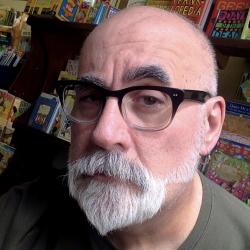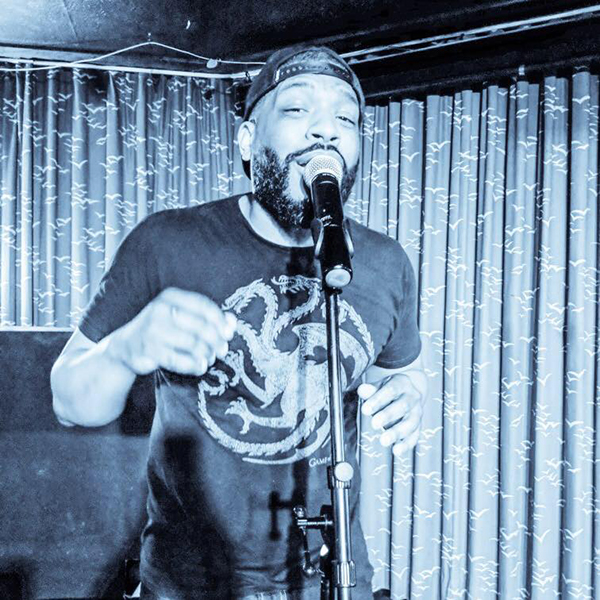
Creating a community of misfits isn’t what music entertainer Darran Mosley intended or expected. After growing up in a “super-rough” neighborhood in Indianapolis, then working in computer systems in Chicago, he landed in Bloomington, where he works in IT by day and in music by night. | Courtesy photo
Darran Mosley’s been a proud misfit for as far back as he can remember. A lot of misfit kids might wish they could fit in better with their friends on the block or with their schoolmates. Not Mosley. He was lucky.
Just as Mosley hit school age, a new drug hit his already-tough neighborhood, 2G, on Indianapolis’s west side. The drug would destroy lives, families, even entire neighborhoods.
“Crack,” Mosley says, “changed the whole landscape of my neighborhood. Rough. Super-rough. You saw a lot of things. You saw a lot of violence. You had to fight a lot.”
Mosley and his three brothers and one sister were fortunate to be growing up in a deeply spiritual, hard-working middle-class family. “I had a lot of love,” he says. “My parents are super-Pentecostal. They kept us safe. We were in church a lot.”
While other kids might have been running around the 2G streets, being seduced by the drug trade or recruited by gangs, Mosley watched and listened as his siblings and parents sang in church. After school, he might plop himself in front of the TV. At Christmastime, he’d watch the claymation Rudolph the Red-Nosed Reindeer.
He was transfixed. There was Rudolph, of course, with his embarrassing proboscis. Mosley, a dreamy look in his eyes, recalls some other characters from the show: “Hermey, the Misfit Elf; Bumble, the Abominable Snow Monster; Yukon Cornelius. They lived on the Island of Misfit Toys.
“They were all, like, trying to figure it out. Hermey wants to be a dentist; he doesn’t want to make toys. You’ve got Bumble. Everyone thinks he’s an awful beast but he’s actually a really cool guy — he just has a toothache. Yukon Cornelius, who’s hunting Bumble, turns out to have a big heart and saves everybody in the end. All the little oddballs.”
Mosley was a little oddball, too. He and his whole family. “We didn’t have a lot of money but we knew we were loved and we knew right from wrong so we made it out,” he says.
Decades later, Mosley would start his own business. Its name? Naturally, Misfit Toy Entertainment. Mosley hosts karaoke performances at several Bloomington venues. He’s got employees. He DJs weddings and other events. He’s developed a following; they call themselves — what else? — the Misfits.
“What I didn’t think about or expect,” Mosley says, “has been the best part of all of this: the community that’s formed around it. The Misfits.”
Who are the Misfits?
“They’re the people who go to karaoke, a group of friends who all vibe the same way. They go to all the places where we do karaoke. They’re a special breed of people. We’re all kind of alike — misfit, weirdo kind of people. I’ve always identified with the misfit. Then it became the name of my business. I never thought it’d be the name of a community.”
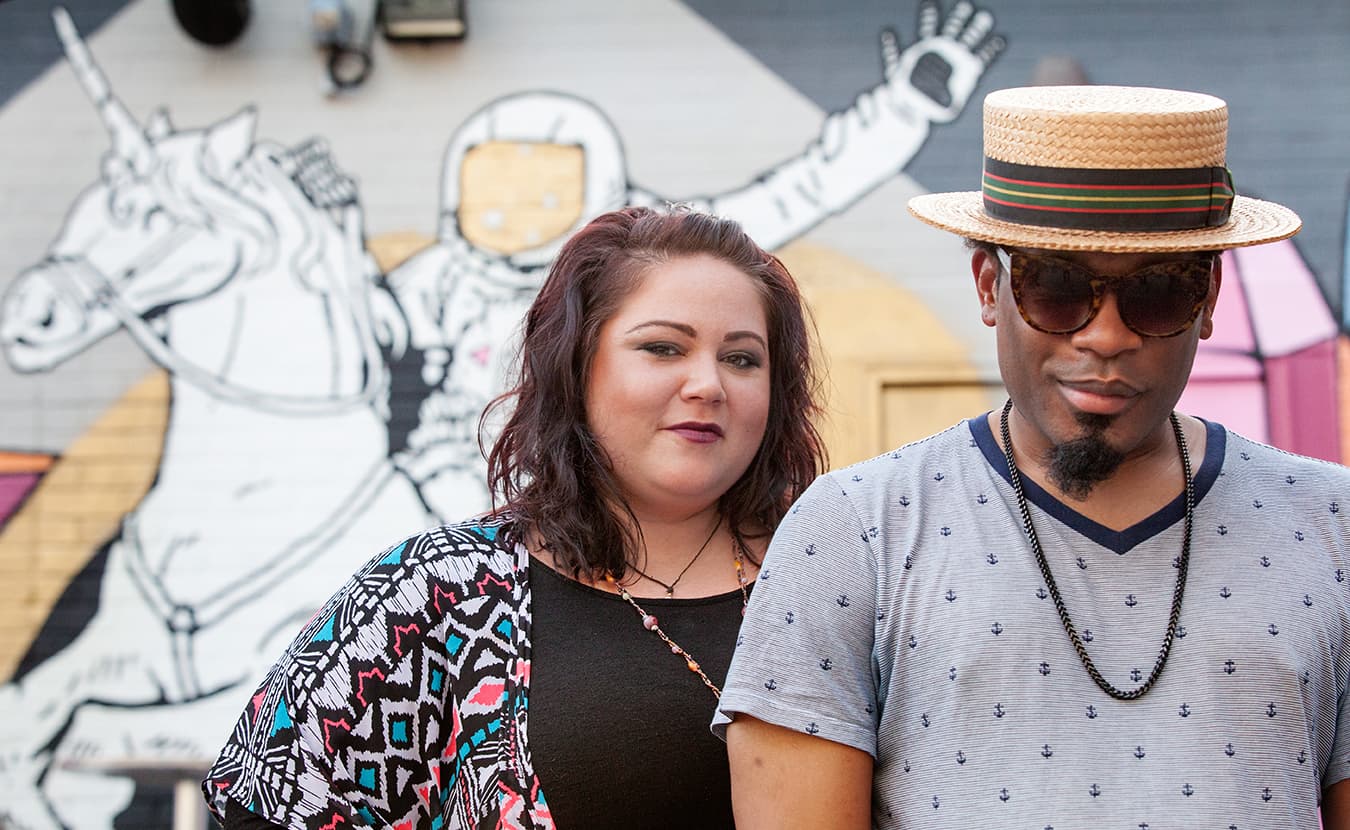
Coley D, left, and Mosley at The Back Door, where Coley D hosts Misfit Toy Karaoke every Sunday. | Courtesy photo
And it all centers around music.
“I was raised around music,” Mosley says. “My family, they’re all really good singers. In the black community, people know. There’s when white people think you can sing and then there’s when black people think you can sing. It’s two different things.
“It’s the attention to detail. Inside the black community, competition exists. Like the Harlem Renaissance — that’s how Harlem turned out all those amazing artists. Even though there’s poverty all around, the people who live there are seeing each other every day and this is what they do. You want to be the best at what you do. The spirit of competition pushes people to new levels. Same thing happens in country music, too — poverty music — when you’re in a situation where that’s all you do and you want to be the best. George Jones and all those guys, all they did was go to church and play music and listen to it and absorb it. That’s what happened in the black community. The Temptations. The Four Tops. The Philly Sound. Anything. Hip-hop. All of it is formed from ‘I want to be the best at it.’”
But little Darran thought he wasn’t good enough. “On a competition level, I’m a B-singer in my family. Maybe a C-singer. We’ve got some A’s. Because of that, I didn’t sing. I just played drums and chilled out. Honestly, no one knew I could sing until I got to college. My brothers all sound like Brian McKnight and Luther Vandross. They’re crooners, man. They can sing ‘Happy Birthday’ and make you melt. I had a different style of voice and I didn’t know how to use it until I got to Indiana University.”
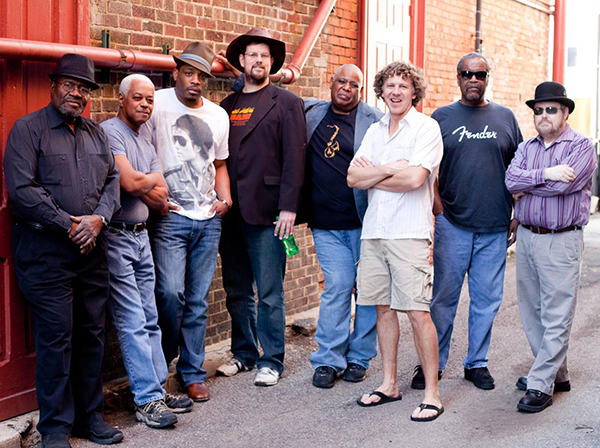
Mosley, third from left, sings lead vocals for The Dynamics. | Courtesy photo
While a student at IU in the late ’90s, Mosley would listen to the urban soul group, Tower of Power, especially its 1973 song “What Is Hip?” Mosley played that disc again and again. The more he listened, the more he thought, “Hey, I can sing this!”
So, he tried out for the African American Choral Ensemble, a part of the IU African American Arts Institute. Led at the time by the renowned IU music-school professor James E. Mumford, the ensemble’s songbook ranges from soul and gospel to classical — all the genres African American composers and performers have worked in through the years.
“That’s where I found my voice, “ Mosley says. “Dr. Mumford — he’s a pillar of this community — was the first person who trusted me enough to sing in front of people. Without him, I wouldn’t be singing today.”
And sing he does. Not only does Mosley often get up on stage at the behest of his loyal Misfits to croon, warble, or belt his way through a karaoke performance, he does lead vocals for both Royalty, a Prince tribute band, and The Dynamics, “old-school funkmasters.”
The rest of The Dynamics are quite a bit older than Mosley. “When I first saw them, I was an undergrad,” he says. “I’m an old-school soul fan. I was just oozin’.” Between sets, Mosley struck up a conversation with one of the players. “I was like, ‘I would just love to sing back-up with you guys. Anything I can do, I’ll do.’”
Mosley does a deep, gravelly voice, recounting the band member’s response: “How old is ya?”
Mosley told him he was 24.
The man rasped in response: “Come back when you’re 40!”
It took Mosley another ten years, but he eventually made his way into the band. He was 34.
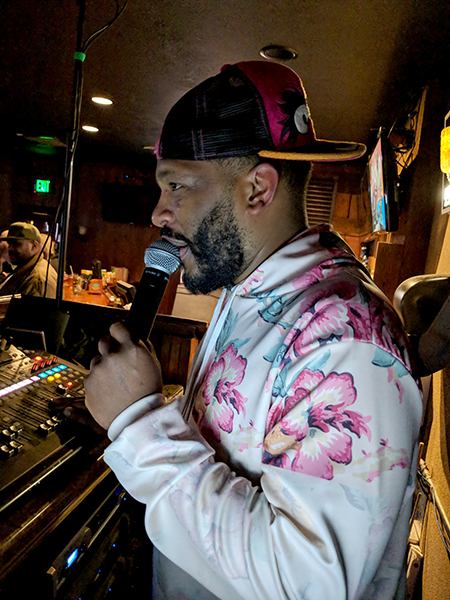
Mosley hosts karaoke performances at several Bloomington venues and has created “a community of misfits.” | Courtesy photo
“That’s soul music, man,” Mosley says. “Gospel was my upbringing.” His deeply religious mother had set out some tough guidelines for him. As a kid, he was not allowed to listen to music containing obscene language or sexual content. She certainly wouldn’t let him go to see the gritty, mean-streets rap and hip-hop acts then beginning to play big arenas around the country. That is, until his aunt interceded.
“We weren’t allowed to listen to any cuss words at all,” Mosley explains. “Somehow, my aunt — my mother’s younger sister — convinced my mother to let her take me to my first concert. It was NWA and Heavy D & the Boyz. The fact that my mother let me go was unbelievable. I could not believe what was happening!”
July 14, 1990. Mosley was 13 years old at the time. The show was at Indianapolis’s old Market Square Arena. NWA performed “Fuck Tha Police,” among its other controversial hits; Heavy D his more showy, visual numbers. After the show, one of Heavy D’s dancers, Trouble T Roy, fell off a concrete ramp leading off the stage and landed on his head two stories below. He died the next day.
“That ended up being a big moment in hip-hop history,” Mosley says. “They wrote songs about Trouble T Roy. That was my first concert.”
The world of live music and performance had been opened up for Mosley. “My favorite show was Prince’s Musicology Live 2004ever tour. My best friend was a member of the Prince fan club. He got special tickets. I didn’t know how special. We kept showing our tickets to ushers and they kept saying, ‘Keep going down front.’ When we got to our seats, literally, we were six feet away from Prince on stage.”
And then Prince died in 2016. “Oh, I cried, man!” Mosley says. “I was at work [he works for Cook Polymer in IT] when I heard the news. I immediately took a lunch break, went to Yogi’s, and just sat there and listened to the music and dealt with it. I had to go back to work but I didn’t do anything the rest of the day.”
It was, perhaps, one of the very few times in his life when Mosley didn’t do anything. He solves system problems at Cook during the day and then plays music or hosts karaoke at night. As an IU student in the mid- and late ’90s, he’d go to Bear’s Place and The Bluebird for karaoke nights. “It was always the same old songs,” he says. He graduated, took an IT job in Chicago for a few years, and then got the opportunity to come back to Bloomington to work for Cook. He went back to Bear’s Place and The Bluebird for more karaoke.
“It was still the same songs,” he says. “They hadn’t changed! I went to Indianapolis, just hanging out, and met a guy named Norm — Norm’s Karaoke — who was using a different system, digital audio files. When digital music came around, it changed the landscape of karaoke. It was just amazing. I thought, ‘We need this in Bloomington.’ I asked him, ‘How do you do this?’ Norm sat with me and taught me the business.
“At that point, the bars here were content to do the same songs over and over again. That was the culture of karaoke here. That’s what I changed. I update regularly.”
Mosley travels light, packing only his laptop with its thousands of audio files, a small mixer, and a PA system. From such modest tools, a community has been formed.
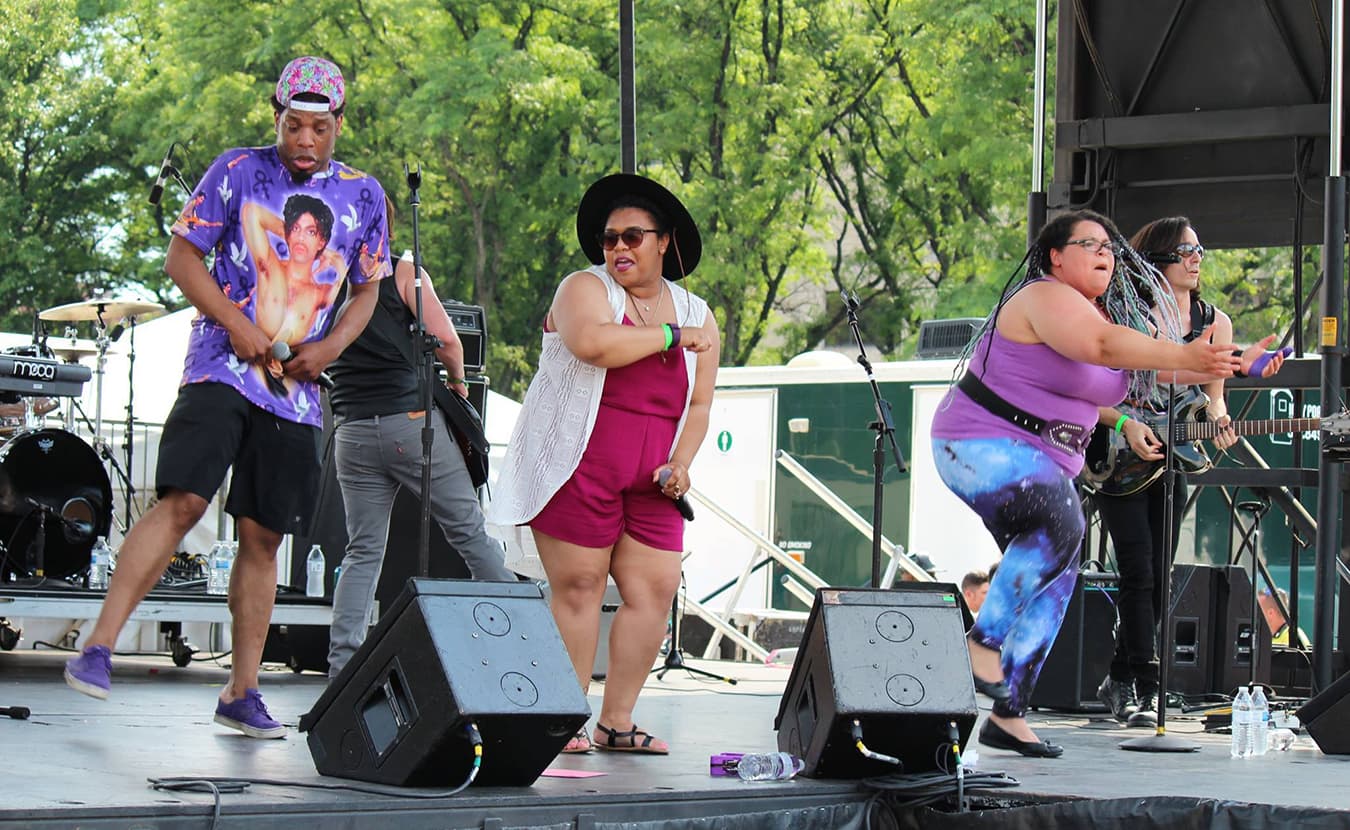
Mosley, left, performs with Royalty, a Prince tribute band. | Courtesy photo
“When I first went out there, I thought, ‘I like karaoke. I think other people will like it too. On a business level, this is a good idea.’”
Mosley bristles when it’s suggested he now runs a local empire. “That just sounds financial. It doesn’t sound like community to me. These are my friends and community now. I’ve never used the word ‘customer’ when describing people that come out. Never once. That vibe doesn’t exist. If you see the camaraderie, if you see how we all meld and hang out, we’re really friends and family.”
Those friends and family are a dedicated, creative bunch. Mosley sponsors the BTown Karaoke League in which teams of six to ten people vie to become champions over a period of several months. Two teams compete each night; they must do two solos and one duet or group number. Mosley sets out the category for each night’s competition. It could be gibberish songs or a movie theme or anything that comes to his fertile mind. The teams that aren’t competing that night vote on which team was better. At the end of the season, the champion team earns $1,000, but most teams have spent far more than that throughout the season on costumes and props.
“Our fifth season should start in January,” Mosley says. “I’m also thinking about branching out to kids, spreading this to the high schools. This is something that theater and choir kids will get into. I’m going to talk to the city about finding a venue for it.”
So the already sizable group of Misfits will grow if Mosley’s high school expansion plans come to fruition. The extent of Bloomington’s karaoke culture still astounds him.
“Who knew?” he says.
He knows now a misfit can become part of a community.
[Editor’s note: Michael G. Glab’s full interview with Darran Mosley can be heard today on his radio show, Big Talk, which runs on WFHB (91.3 FM, 98.1 Bloomington, 100.7 Nashville, 106.3 Ellettsville) every Thursday at 5:30 p.m. and will be available, along with podcasts of past shows, at WFHB.org. Each of Glab’s monthly profiles for Limestone Post is based on one of his Big Talk interviews and will be posted on the same day that the interview airs on Big Talk.]

